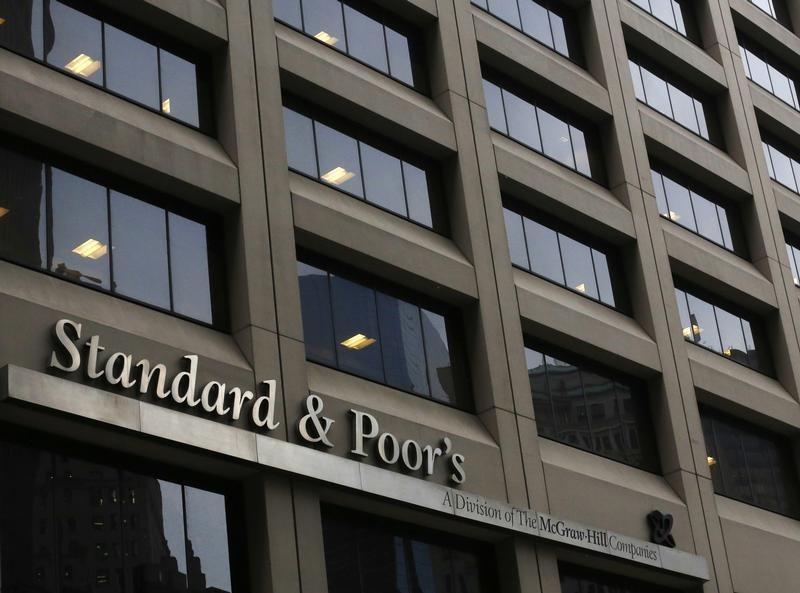By Sujata Rao
LONDON (Reuters) - After a golden decade of improvement, credit ratings for a swathe of developing economies risk falling back to "junk", with huge potential costs for up to a tenth of outstanding emerging market bonds.
Many mainstream investment and pension funds have rules preventing them from holding debt unless it is classified as investment grade by at least two of the big ratings agencies, and a number of countries are at risk due to problems ranging from tumbling commodity export prices to political instability.
Russia this week became the first of the major economies to lose its investment grade status from Standard & Poor's, falling out off the top ratings category for credits deemed to have a low risk of default for the first time in a decade.
If Moody's and Fitch follow, conservative investors barred from owning junk securities must sell their holdings. JPMorgan estimates this means they may ditch $6 billion in Russian government rouble and dollar debt.
Russia may have company. Almost $260 billion worth of sovereign and corporate bonds - nearly a tenth of outstanding emerging market (EM) debt - is in danger of being relegated to junk, according to David Spegel, head of emerging debt at BNP Paribas, who calls such credits "falling angels".
What's more, almost $1 trillion of debt is rated BBB or BBB minus - the two lowest investment grade ranks after which junk or "high yield" status awaits.
"After a year of political upheaval and collapsing commodity prices, the sky is alight with EM falling angels," Spegel said.
TABLE of emerging markets ratings.
In 2010, for the first time, a majority of bonds in the EMBI Global index of emerging market debt became investment grade <11EML>. But now a fifth of emerging market governments rated by S&P carry negative outlooks; the agency calls emerging markets the "weak link" in the global ratings picture.
If there is a series of downgrades, the entire index could shift lower again, Spegel warned, adding: "The EM benchmark index is at risk of becoming a falling angel."
Ratings models compiled by analysts at Bank of America/Merrill Lynch show downgrade risks in Brazil, Russia, Turkey, South Africa and Indonesia.
Some of these, such as energy importers which benefit from falling oil prices and countries making economic reforms, may avoid relegation.
However, ratings tend to move up and down in tandem, BofA noted. It cited negative credit revisions in the 1980s, upgrades in the early 1990s, downgrades in the late 1990s and another round of upgrades this century. Two-thirds of emerging economies are investment grade, up from 42 percent a decade ago, it added.
"Investors may well view initial downgrades not as isolated events but as the beginning of a new trend," BofA said.
INDEX EJECTION RISK
Russian, Turkish, Brazilian and South African local bonds - among the handful of emerging market names included in the Barclays Global Aggregate index - risk ejection from the $2 trillion benchmark if they are downgraded.
Falling angels which lapse into junk status will also drop out of the investment grade portion of the EMBIG index which has up to $7 billion benchmarked, JPMorgan says.
"The big worry is for countries in the low investment grade range, such as Russia and Brazil. Falling into the junk bond range cuts you off from the largest segment of bond buyers," said Peter Marber, head of emerging debt at Loomis Sayles.
That's especially so in the case of big insurers and banks which are extremely sensitive to ratings due to tighter regulations on capital reserves and asset quality, he noted.
Also, company ratings tend to be constrained by the sovereign, Marber said, adding: "So if we see countries downgraded into high-yield status, it may trigger automatic corporate downgrades which would dramatically restrict access to international capital."
All this will raise capital costs for borrowers, adding to pressures caused by the possibility of higher U.S. interest rates and Treasury yields which will suck funds out of emerging markets.
Exactly how much emerging bond yields will rise is impossible to calculate. But BofA/Merrill reckons a one-notch downgrade to junk tends to produce a 40-60 basis point increase in yield and credit default swap spreads.
BNP's Spegel calculates that for every 10 falling angels, spreads over U.S. treasury bond yields on the CEMBI EM corporate debt index will widen by 125 basis points and sovereign spreads will blow out 241 bps.
On the plus side, though, some risk is already priced in. Russian and Kazakh bonds for instance trade as though they were several notches into junk.
Also ratings don't much matter to dedicated emerging market funds and increasingly to some institutional investors who may base allocations on asset managers' analysis, rather than solely on ratings.
Wayne Bowers, EMEA and Asia chief investment officer at Northern Trust, says many big investors have built in the flexibility to hold different kinds of emerging assets in recent years. Also, he notes, while some countries' outlook has darkened, others will benefit from reforms and cheaper oil.

"People usually understand EM is not a low-risk asset class." Bowers said. "You will find the return profile of the broader indexes can offset the negatives... It's not just focused on countries that are fragile but also those that benefit from falling oil prices."